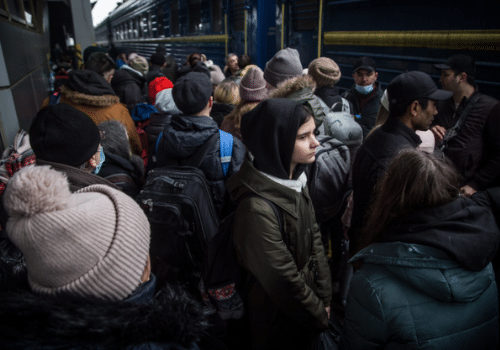The time of the humanitarian diplomat
This blog explores the concept of humanitarian diplomacy and examines the value of diplomatic thinking and practices for contemporary humanitarian practice.

Putins’s invasion to Ukraine has lasted over a week. Over one million Ukrainians have fled the country to surrounding territories and beyond. Conditional to the continuation of the armed conflict, this signals a beginning of a mass flight in a population of 44 million Ukrainians. The UN Refugee Agency UNHCR estimates that over the course of coming weeks and months, four million people more are expected to seek refuge outside of Ukraine.
four million people more are expected to seek refuge outside of Ukraine
Prior to the breakout of the nation-wide armed conflict, Ukraine already had 2.9 million people in humanitarian need in its Eastern parts of the country. This group of Ukrainians who are deemed vulnerable in a humanitarian sense has now dramatically expanded both in size and geographical location. Numerous civilians are trapped between the warring parties, and humanitarian agencies – those who are able to operate in parts of the country – carry out limited distribution of humanitarian aid in high-risk environments. Unacceptably, the number of civilian casualties both in death and injured range according to the source and time, with current estimates around 750 people.
In addition to the global machinery of humanitarian efforts with notable actors such as the United Nations and the Red Cross movement, grassroots humanitarian movements are on the rise, meaning individuals themselves taking humanitarian action. Showcasing acts of compassion and assistance to Ukrainian refugees and internally displaced people increase day by day, painting a multifaceted picture of who constitutes a humanitarian actor and what is considered humanitarian action. Particularly the Ukrainian diaspora across the world feels the urge to mobilise people and distribute resources in the potential benefit of their fellow citizens.
Despite the world’s focus on Ukrainian territory and sovereign state violations at the moment, there are humanitarian considerations in the same context that currently remain under-addressed. Ukrainians are in the midst of the conflict zone and bear dire consequences of the war for which humanitarian focus and efforts in and around the country need to intensify. However, they are not the only population affected within the conflicting parties – sanctions on Russia currently bear and will continue to take an ever-increasing toll on the Russian population, affecting the society as a whole. Lifetime savings plummet with the free fall of the Russian ruble, and access to basic commodities, such as medicine and food, decrease rapidly with an increasing isolation from the international system.
Russia has been able to lower its poverty rates in the last two decades from 24.6 percent of the population into 12.1 percent, a figure which still translates into 17.4 million people living under the poverty line prior this conflict. Putin’s armed attacked on Ukraine will quickly deteriorate this trend and achieved progress. International measures similar to those experienced during Cold War hit hardest to those who are hitherto furthest behind in the Russian society. As in any humanitarian situation, conflicts deteriorate and magnify already existing vulnerabilities and suffering, making any efforts of progressive universalism – pursue to reach those worst off in a given society – further out of reach.
Ukrainians bear an unacceptable cost of Putin’s military invasion, and much of the damage is already done. What can change, however, is mitigation and alleviation of the human suffering going forward. In addition to the Ukrainians carrying the humanitarian burden of this conflict, Russia is another home for a humanitarian disaster in its near future should the conflict and its secondary effects remain ongoing. Therefore, both parties and the international community at large are in immediate need of respecting the humanitarian principle of humanity, and have high stakes to engage in instant humanitarian diplomacy. This entails public and private forms of negotiation, persuasion, and strategising at all political levels, among other diplomatic practices, to influence the decision-makers to act in the direct interest of the people in humanitarian need – regardless of the nationality or state in conflict.
both parties have high stakes to engage in instant humanitarian diplomacy